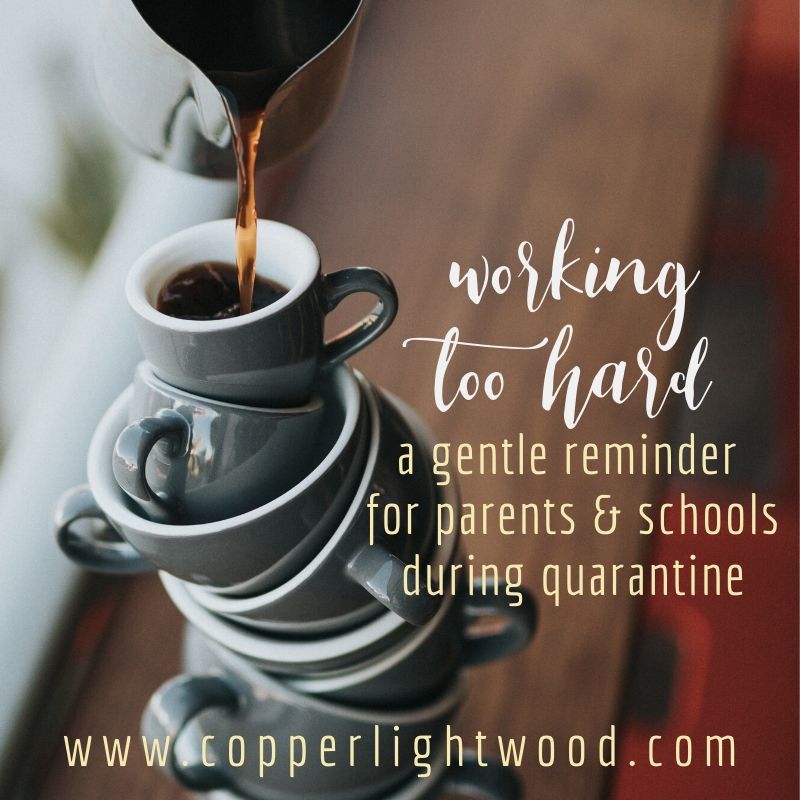We started a new routine around here last winter. While Vin puts the little boys to bed, Chamberlain grabs The Lord of the Rings and a hairbrush, and I read aloud while she brushes my hair. A few pages later, Vin comes back downstairs and listens in until I get to the next stopping point.
It’s been a beautiful, blissful way to wind down at the end of the day.
Until suddenly, it wasn’t.

Suddenly, I couldn’t handle the slightest snag from the hairbrush. I was too tired to read or hold the book. Doing one more thing at the end of the day, even a relaxing thing like reading, was just one thing too many. Maybe several things too many.
At first I thought it was okay. Just normal mom stuff; we know what it is to live without sleep and to push our bodies further than we think we can go. But when several issues compounded and the pain got so bad it made my heart race, it was clear I needed to make an appointment.
So I went to the ANP with my list of woes. She listened, poked and prodded, and asked all the questions before concluding that I was dangerously sleep deprived and possibly dealing with an autoimmune disorder. She used words like “worried” (referring to her) and “shutting down” (referring to me) and “stubborn” (also me).
Her main recommendation was to do whatever it takes to start getting enough sleep again. And to help facilitate that, she had some other ideas.
You’re not gonna like this, she said: A 30-day paleo reset, and start weaning the baby. And she was right, I didn’t like either of them, but they both resonated with what’s going on, so, whatever. She also gave me a couple of supplements and some referrals for follow up, including labs and imaging. And just for kicks, bless her heart, she suggested other things too — but she used that word “stubborn” again (twice!) and admitted I probably wouldn’t even consider them. And she was right on that, too.
So I went home with the notes and the supplements and the packet of paleo information. A quick glance informed me that it meant no grains, no dairy, no sugar, no prisoners.
And then I dumped everything on the counter and made myself a quesadilla.
Which I ate while nursing the baby.
I told myself it was okay though, because the quesadilla had fermented jalapeños (See? Veggies and probiotics!) and I wasn’t starting yet, anyway. I’d start the whole shebang for reals in a couple of days, to give me time to get out the month’s newsletter and mentally prepare for what I was getting myself into.
“And now leave me in peace for a bit! I don’t want to answer a string of questions while I am eating. I want to think!”
“Good Heavens!” said Pippin. “At breakfast?”― J.R.R. Tolkien, The Fellowship of the Ring
For now, I would just read the paleo guidelines. I grabbed the packet from the counter and noticed it already had a smear of something on the back of it. I looked closer and realized it was cream sauce. Perfect.
The packet said yes to all the meats, yes to all fruits, yes to all vegetables. But wait – what’s this, special notes for autoimmune issues? No eggs, no nightshades.
What the heck is a nightshade, I thought.
It sounded like something out of Middle Earth, along with all of Tolkiens’s other unfamiliar words, like fen, tussock, sloe, dingle. That world isn’t an unfamiliar landscape to me – this is my fifth venture into Middle Earth – but the language continues to stretch me. Sward, eyot, wythe. Or turves, which isn’t so unfamiliar once you realize it’s the plural of turf; or meads, which is generally paired with “rolling.” Rolling meads. So, fields. Ahh, meads, like meadows. Gotcha.
I’m still not sure if some of the words are mythical – a whortle-berry? Is that real? Mallorn, athelas? Living in Alaska my entire life, there are plenty of names I’ve only heard of but never experienced – things like crepe myrtle, palmetto, full-service gas station.
We have our own landscape and language: tundra, birch, lupine, forget-me-not, cheechako, bunny boots. And places, too – instead of Lothlorien, we have Hatcher Pass; instead of the Rauros and the Withywindle, we have the Matanuska, Knik (pronounced “kuh-nik”), and Kenai Rivers. This is the language I know.
But no, I searched the internet, and nightshades are not from Middle Earth. Turns out, nightshades is actually code for All The Veggies That Shannon Likes Best.
Including jalapeños. Blankety blank.
So for the last several weeks I’ve been eating all the right things (except for my morning latte, which we won’t talk about), taking my supplements, drinking a ton of water, and taking in the Word however I can. And He’s been speaking to me about some new ways to do it.
The drink was like water…the effect of the draught began at the toes, and rose steadily through every limb, bringing refreshment and vigour as it coursed upwards, right to the tips of the hair.
– J.R.R. Tolkien, The Two Towers
A year ago He asked me to start praying online, but now He’s asking me to read the Word – not just quietly to myself, but aloud to whoever will listen online. And like last time, I put it off because I wasn’t sure how to do it. Finally I clearly heard Him say, Just start doing it, and I’ll show you how. So I did, and He is.
Will I edit the video and make it fancy? Nope. Will I mispronounce names? Yes, unapologetically, and I’ll have fun doing it. Will I brush my hair beforehand? If past performance is any indication of future success, um…the odds aren’t very good.
But the Word is powerful, and the spoken Word is even more so, and God uses the enemy’s tactics against him in beautiful, ironic justice. When the CEOs of social media use their profits to fund or further the enemy’s agendas, what better way to respond than use those platforms to share God’s word?
All Scripture is breathed out by God and profitable for teaching, for reproof, for correction, and for training in righteousness, that the man of God may be complete, equipped for every good work.
– 2 Timothy 3:16-17, ESV
I started about a week ago. Meanwhile, my imaging results came back clear and the labs ruled out autoimmune disorders, praise God.
Health and hope grew strong in them, and they were content with each good day as it came, taking pleasure in every meal, and in every word and song.
– J.R.R. Tolkien, The Fellowship of the Ring
This is beautiful news, not only because YAY, one less diagnosis, but also because I can eat nightshades and eggs again.
I’ve discovered that the way to appreciate a 30-day paleo reset is to spend the first two-thirds of that time fasting from nightshades, and then celebrating with the most amazing hashbrowns ever, complete with fried egg, mushrooms, and aioli.
And, in case aioli is unfamiliar to you, it’s just a little mayo mixed with an acid and herbs, in a million variations – vinegar, lemon, lime, cilantro, sriracha, garlic, swoon. My favorite is with lemon, cayenne (hello, you beautiful nightshade, you!) and dill.
So, Aioli – I’m pretty sure it’s Italian for “forgot to buy salad dressing.” And now you can add that to your vocabulary, too.



